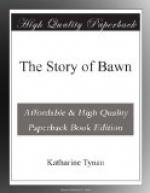There is a photograph of my Uncle Luke on the chimney-piece, an artless thing of a country photographer. He is wearing his militia uniform, and even the country photographer had no power to destroy the bonny charm which sat on his eyes and his lips.
Now Maureen had, whether from increasing years or from the lonely life she led, come to have delusions at times, to mix up me with my mother or my Aunt Eleanor, to talk of Uncle Luke as though he were yet with us or might be expected at any moment home from college, or from a hunting day or a fair or market, or his training with his regiment on the Curragh of Kildare.
But on this day she was clear enough in her mind.
Uncle Luke’s old setter, Dido, that was a young thing when he went away, had followed me upstairs and lay along the rug with her head on my lap. Now and again she pricked her ears as though she heard something or thought she did. It was Dido who led us on to talk of Uncle Luke. Maureen is no more tolerant of dogs about her than others of her class, but she tolerates Dido because she belonged to Uncle Luke.
“If his Lordship had a real kindness for that old dog,” she began, “he’d poison her and put her out of her trouble.”
Dido looked back over her ears at her as a dog will, knowing itself discussed.
“I don’t think Dido would call it a kindness, Maureen,” said I. “Let me see—how old is she?”
“She must be nigh on fifteen years old. I remember well the day Master Luke brought her home. I wonder his Lordship can bear to have her about, seeing who it was that gave her to him.”
“And who was it, Maureen?” I asked.
Her old eyes narrowed themselves cunningly.
“No one could ever say, Miss Bawn, that I talked about the family.”
“Very well, Maureen,” I said. “But I am to hear it, all the same. Miss Champion is going to tell me. She said so to my grandmother yesterday, and would have done it then only that she feared to disturb Gran. I am going to her this afternoon to talk about our trip to Dublin, and then she will tell me.”
“That is the way,” said Maureen, with great bitterness. “People will tell you not to tell things: and when you’ve held yourself in till you’re fit to burst after all those years they’ll tell themselves. Why shouldn’t you know, Miss Bawn, my lamb? There’s some for Master Luke and there’s some against him, but I’m for him whatever story was the true one.”
“So should I be, Maureen,” said I. “I remember how he carried me round the stables and to the kennels on his shoulder, and how he brought me in to see Bridget Kinsella, the huntsman’s wife, and she gave me bread and brown sugar with cream over it. And when we were coming back it was cold, and Uncle Luke carried me inside his coat.”
“Aye,” said Maureen, “he was ever softhearted. A bit wild, but not more so than became his station. And if Miss Champion had been kinder with him the trouble need never have happened.”




